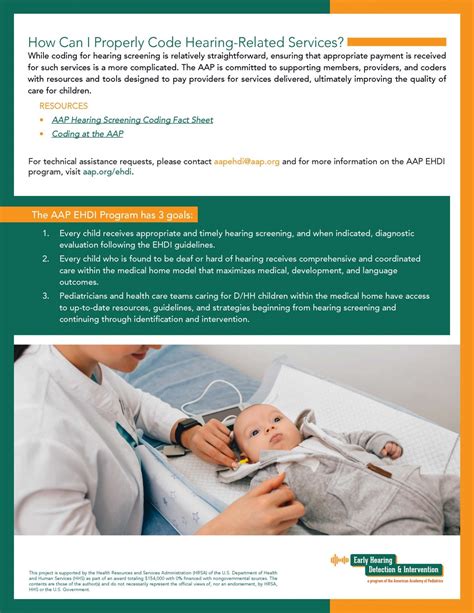Introduction
Newborn hearing screening (NHS) plays a crucial role in identifying infants with hearing loss and ensuring their timely access to appropriate interventions. NHS professionals play a vital role in this process, and their dedication and expertise can make a profound difference in the lives of children and families. This comprehensive guide explores the world of newborn hearing screening jobs, covering essential aspects, qualifications, and career opportunities.

Why NHS Matters
Hearing loss, whether permanent or temporary, can significantly impact a child’s speech, language, and overall development. Early detection and intervention are essential to minimize these effects and ensure that children with hearing loss have the best possible outcomes. NHS provides a critical opportunity to identify infants who are at risk of hearing loss, allowing for prompt diagnosis and appropriate intervention.
Benefits of a Newborn Hearing Screening Career
- Making a Difference: NHS professionals have the privilege of playing a pivotal role in ensuring the early identification of hearing loss and improving the lives of children and their families.
- Job Security: With the increasing awareness of the importance of early hearing screening, NHS professionals are in high demand and enjoy stable employment opportunities.
- Personal Fulfillment: Witnessing the positive impact of their work on the lives of children and families can bring immense personal fulfillment and satisfaction.
- Continuous Learning: Advances in technology and research in the field of hearing screening provide opportunities for continuous professional development and growth.
Qualifications and Training
- Bachelor’s Degree: Most NHS professionals hold a bachelor’s degree in a related field, such as audiology, nursing, or speech-language pathology.
- Specialized Training: Additional training in newborn hearing screening is typically required, including clinical practicum experience.
- Certification: Voluntary certification programs, such as the Certificate Holder in Newborn Hearing Screening (CHNS) or the National Board for Certification in Hearing Instrument Sciences (NBC-HIS), demonstrate expertise and commitment to the field.
Job Roles and Responsibilities
NHS professionals perform a range of duties, including:
- Screening Infants: Conducting hearing screenings on newborns using portable equipment to identify infants at risk of hearing loss.
- Following Up: Tracking infants who do not pass the initial screening and scheduling follow-up appointments for further evaluation.
- Referral and Collaboration: Referring infants with confirmed hearing loss to appropriate specialists for diagnosis and intervention, and coordinating with other healthcare providers.
- Patient Education: Providing information and support to parents and caregivers about hearing loss and early intervention options.
Career Pathways
NHS professionals can pursue various career paths, such as:
- Clinical Audiologist: Providing comprehensive audiological services, including NHS, diagnostic testing, and hearing aid fitting.
- Neonatal Nurse: Specializing in the care of newborns and infants, including conducting NHS.
- Public Health Nurse: Focusing on population-based health initiatives, including NHS programs.
- Research Scientist: Conducting research to improve NHS protocols and technologies.
Innovative Ideas for Expanding NHS Applications
Beyond traditional screening methods, innovative ideas can further expand the reach and effectiveness of NHS programs:
- Telemedicine: Utilizing telemedicine platforms to provide remote NHS screenings in underserved areas.
- Mobile Health: Developing mobile applications that enable parents to screen their infants at home.
- Artificial Intelligence: Incorporating artificial intelligence algorithms to analyze hearing screening data and improve accuracy.
Comparing Pros and Cons
Pros
- Meaningful work with a direct impact on children’s lives.
- High demand and job security.
- Opportunities for continuous professional development.
- Flexible work schedules and varying job environments.
Cons
- Can be emotionally challenging when working with infants with hearing loss.
- Occasional travel may be required.
- May involve working weekends or holidays.
Table 1: Key Statistics on Newborn Hearing Loss
| Statistic | Source |
|---|---|
| 2-3 per 1,000 newborns affected by hearing loss | Centers for Disease Control and Prevention (CDC) |
| 90% of infants identified through NHS receive early intervention | American Academy of Pediatrics (AAP) |
| Early intervention can significantly improve outcomes for children with hearing loss | National Institute on Deafness and Other Communication Disorders (NIDCD) |
Table 2: Qualifications and Training Requirements for NHS Professionals
| Requirement | Level |
|---|---|
| Bachelor’s degree in a related field | Required |
| Specialized training in newborn hearing screening | Required |
| Voluntary certification (CHNS or NBC-HIS) | Recommended |
| Continuing education and professional development | Ongoing |
Table 3: Job Roles and Responsibilities of NHS Professionals
| Role | Responsibilities |
|---|---|
| Clinical Audiologist | Conducting NHS, diagnostic testing, and hearing aid fitting |
| Neonatal Nurse | Care of newborns and infants, including NHS |
| Public Health Nurse | Population-based health initiatives, including NHS programs |
| Research Scientist | Research to improve NHS protocols and technologies |
Table 4: Pros and Cons of Newborn Hearing Screening Jobs
| Pros | Cons |
|---|---|
| Meaningful work with a direct impact on children’s lives | Can be emotionally challenging when working with infants with hearing loss |
| High demand and job security | Occasional travel may be required |
| Opportunities for continuous professional development | May involve working weekends or holidays |
| Flexible work schedules and varying job environments |
Conclusion
Newborn hearing screening jobs offer a unique and rewarding opportunity to make a positive impact on the lives of children and families. By identifying hearing loss early, NHS professionals play a crucial role in ensuring that children receive timely intervention and have the best possible outcomes. With its high demand, job security, and opportunities for personal fulfillment, a career in newborn hearing screening offers a meaningful path for those dedicated to improving the health and well-being of children.
